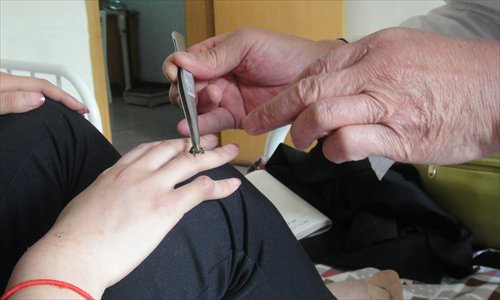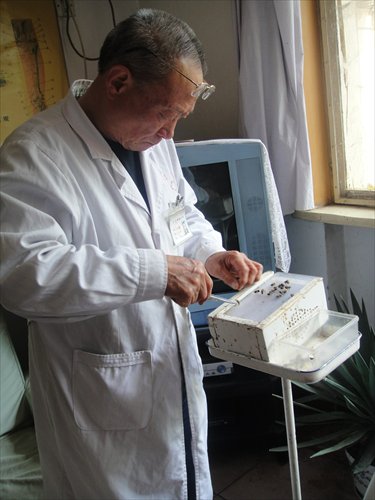HOME >> METRO BEIJING
Bee healthy
By Chen Ximeng Source:Global Times Published: 2014-4-22 19:13:01

A doctor allows a bee to sting a patient. Photo: Chen Ximeng/GT

A doctor removes live bees from a box in preparation for an apitherapy session. Photo: Chen Ximeng/GT
Lying on her bed in the Beijing Apitherapy Hospital, Liu Yu, 27, gritted her teeth as she was stung repeatedly by bees.Using tweezers to hold a bee above Liu's neck, attending doctor Wang Menglin allowed the insect to sting her jugular acupoints, and leave behind its stinger and venom sac on the skin.
"The devil of disease is more horrible than the stings of bees," said Liu, who takes an average of 80 stings over her entire body during her daily treatment.
In 2010, after experiencing numbness in her legs, Liu was diagnosed with multiple sclerosis (MS), an often debilitating disease in which one's own immune system eats away at the protective myelin sheath that covers the nerves. There is no known cure for MS, but Liu sought treatment at West China Hospital of Sichuan University. After being injected with hormones for five days, Liu's condition worsened. She lost faith in Western medicine.
Based on a few recommendations, Liu then turned to the Beijing Apitherapy Hospital in Shunyi district, where she met with Wang. After a month and a half of treatment in 2010, Liu was back on her feet.
"The treatment is definitely painful, but after being stung, I feel better and there is no pain in my legs," said Liu.
"Apitherapy is a comprehensive treatment for more than 30 diseases. This biological therapy of traditional Chinese medicine includes bee sting acupuncture and injections of bee venom," said Wang, who is also the director of the Beijing Apitherapy Institution.
The active substance in bee venom is said to strengthen the immune system by stimulating the acupoints and spreading to the surrounding area. Apitherapy is especially effective for people suffering from forms of arthritis, according to Wang.
A 46-year-old woman surnamed Li, head nurse of a major hospital in Beijing, found relief via apitherapy from the rheumatism that had plagued her for over ten years.
Wang, who had her doubts about apitherapy at first, had at first turned to other treatments. "However, with apitherapy, there are no side effects, whereas the Western medicine I took caused other problems with my liver and kidneys," said Li. In 2012, the pain in her feet was so intense that it affected her stride. She began the apitherapy treatment in June 2013. "After starting this therapy, I no longer walk with a limp," she said.
Every week, Li goes to the hospital for almost 30 bee stings and four injections of bee venom; each session costs her less than 300 yuan ($48.21).
In 2007, apitherapy was listed as an official treatment by the then-Ministry of Health and Ministry of Public Affairs.
There are now 100,000 medical workers in China administering apitherapy to about 1 million patients, said Wang. He notes, however, that it is very difficult to promote it in large hospitals. "Many clinics or private hospitals in the mountainous areas where medicine is scarce prefer apitherapy, because it is very cheap but very effective. But most public hospitals do not accept it because it doesn't bring much profit to the hospital," said Wang.
Though treatment has proven to be very effective at his hospital, there is still skepticism about the safety and effectiveness of the medicinal use of bee venom. In fact, according to a 2011 report in UK newspaper The Telegraph, a British food watchdog group ruled that consuming bee venom could not be considered safe, which triggered a larger ban on bee venom honey.
"Bees have been used for more than 3,000 years in China to treat arthritis," countered Wang. "We have been treating patients since 1989, when the clinic was established. And there are almost no cases of relapses after they receive a treatment."
Posted in: Metro Beijing